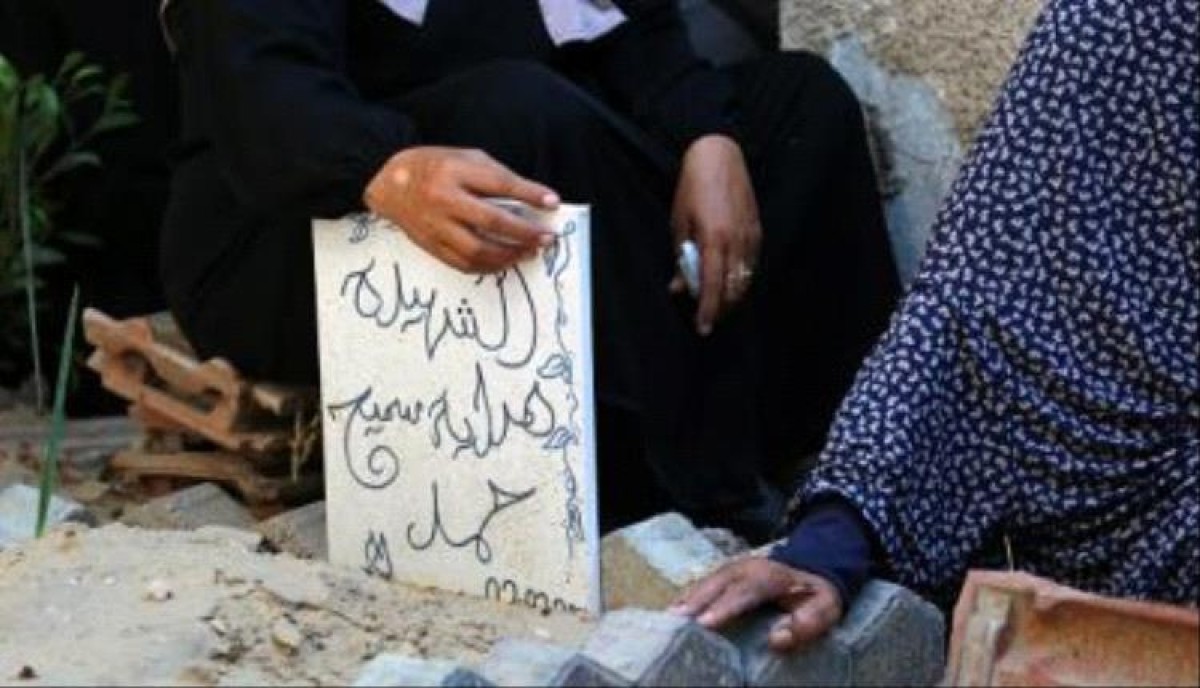Hayat Abu Hatab.. a Palestinian woman who makes martyrs’ graves from the rubble of Gaza’s homes


Palestinian Hayat Abu Hatab lives in difficult living conditions and struggles with her family members to secure a living, fraught with great challenges in light of the continuation of Israel’s devastating war on the Gaza Strip. Hayat (58 years old) works with her children and grandchildren to recycle the rubble of destroyed homes, including stones and skewers. Iron to prepare supplies for the graves of martyrs, whose numbers are increasing day after day.
The fifty-year-old woman, who has many wrinkles on her hands and face, and who was forcibly displaced more than once, stands shoulder to shoulder with her children and grandchildren at all stages of preparing the graves, in light of a severe shortage of necessary building materials as a result of the Israeli occupation’s control of the Gaza Strip’s crossings and their closure. Abu Hatab says in a voice full of pain and bitterness: “The number of martyrs is increasing greatly with the continuation of Israel’s war and massacres, and there is an urgent need to build and equip the graves of the martyrs and the dead.”
The graves of the martyrs are affected by the siege of Gaza..
Abu Hatab, carrying simple primitive equipment in her hands, adds: “We break tiles and stones into small sizes instead of aggregate (small stones) that are not available, because cement is very expensive due to its scarcity in the Strip,” noting that there are no building materials that can be used in it. Preparing the graves appropriately due to the closure of the crossings and Israel’s prevention of their entry, so she began looking for alternatives to preparing them and turned to using the rubble of destroyed homes. She continues: "Sometimes we were forced to bury the martyrs in the sand, due to the lack of prepared graves due to the lack of materials necessary to prepare them." She explains that she obtains iron from the rubble of houses, where she breaks the stones surrounding it, then adjusts and cuts it appropriately as she wants to use it in preparing graves.
While her grandson Musa (14 years old) collects destroyed stones from one of the cemeteries that the Israeli occupation army bulldozed during its previous attack in Khan Yunis, the Palestinian woman prepares the cement mixture to create grave tiles (a piece placed on the surface of the grave). The child works hard and enthusiastically despite the difficulties, holding in his small hand pieces of rubble from the rubble of homes destroyed by the war, placing them inside a plastic bucket and traveling long distances to deliver them to his grandmother and uncles. Abu Hatab says: “The price of cement is very high due to its scarcity, so we prepare the cement mixture, spread it into tiles, leave it to dry, and then close the graves of the dead and martyrs with it.”
Abu Hatab adds: “There is not a sufficient number of workers in this field to prepare the graves and the necessary tiles. We rely heavily on young children and grandchildren to collect stones from destroyed places and break them.” Young children sit together in their simple clothes, while the air is filled with dust rising from the process of crushing scattered stones.
On the fifth of last May, Israel closed the Kerem Shalom crossing, which is the only commercial crossing in the south of the Gaza Strip, and on the seventh of last May also took control of the Rafah crossing between the Gaza Strip and Egypt and closed it, while closing the “Erez” crossing. The northern Gaza Strip has been designated for individuals since October 7th.
Abu Hatab called for the Gaza Strip crossings to be opened to bring in the cement, aggregate, and building materials needed to prepare the graves, in light of the significant increase in the number of deaths over the past period.
With American support, Israel has been waging a devastating war on Gaza since October 7, leaving more than 132,000 Palestinians dead and wounded, most of them children and women, and more than 10,000 missing, amid massive destruction and deadly famine. In disdain for the international community, Tel Aviv continues the war, ignoring the UN Security Council resolution to stop it immediately, and the orders of the International Court of Justice to take measures to prevent acts of genocide and improve the catastrophic humanitarian situation in Gaza.